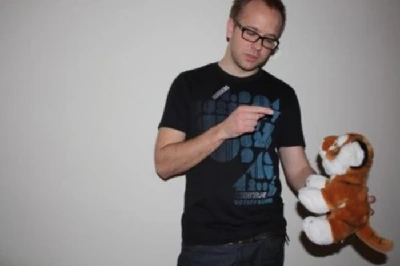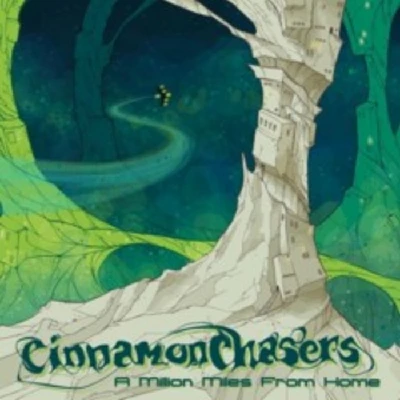published: 24 /
6 /
2009

DJ, producer, multi-instrumentalist Russ Davies, who makes music under the moniker of Cinnamon Chasers, is the son of Dave and nephew of Ray Davies from the Kinks. He speaks to Lisa Torem about Cinnamon Chasers' just released debut album, 'A Million Miles from Home'
Article
Experiencing DJ, producer, multi-instrumentalist Russ Davies' June release, (Modus) 'A Million Miles from Home' is much like soaring on a hypnotic, hang-glider through cumulus skies.
But, after a gentle, earth-bound landing, I wanted to know what inspired this exquisitely electronic sci-fi epic which weaves the unpredictable spirit of 'A Midsummer’s Night Dream' with illustrious layers of billowy texture and the occasional eerie black hole.
Great Britain’s Russ Davies has DJ’d and travelled the world and heads to the US for a tour this fall. In this Pennyblackmusic interview he discusses his production strategies, musical inspirations and more.
PB: Before producing, ‘A Million Miles From Home’ you produced three EPs, ‘Jetstreams’ ‘Modern Love’ and ‘White Flag’ How would you describe your new release in relation to those EPs?
RD: The new release is a real journey, more epic. There are two sides to Cinnamon. One side is emotional, retrospective and dreamy. The other side is for dancing, jumping and loosing yourself in club. The album is the emotional journey side, and all the singles are for the clubs and Djs. That's the idea.
PB: You were influenced by the Italian composer/producer Giorgio Moroder who wrote the soundtracks for ‘Midnight Express’ (1978), ‘Flashdance’ (1983) and ‘American Gigolo’(1988). You were also influenced by the Greek composer Vangelis who wrote the soundtracks for ‘Chariots of Fire’ and ‘Blade Runner’ What attracted you to these composers? How does your work draw parallels or differ? Do you see yourself writing film soundtracks?
RD : They both combine my two favourite musical qualities perfectly – Emotion and aesthetics. They are great musicians and write beautiful melodies and songs but they produce them in with the electric aesthestic of the 80s that has inspired many musicians for years to come. I am essentially a song writer but I like to find ways to produce my raw songs ideas into different forms and for this Cinnamon album, Moroder and Vangelis we'=re the right reference.
Can I see myself making film music? Well yes I'd love to of course – but my time at the moment is gigging and running the record label, Modus Records.
PB: During the late 80s and early 90s the British acid-house movement was popular. The group KLF pioneered “stadium house” music. Did you see yourself as part of these movements?
RD: KLF were kings - they are another huge influence for me. But in the end they got a bit too clever for their boots I think and started burning money and shit like that. But anyway, they were very talented and commercialized underground house music into huge anthems that get played right across radio platforms as well as maintaining playability in the underground clubs. That's very clever.
Personally I love their tripped out ambient music the most. But they were slightly before my time - I'm not from the “summer of love generation” no...
PB: The British Invasion group, the Kinks, some say, set the hard-rock prototype with the infectious guitar riffs of ‘You Really Got Me’, and ‘All Day And All Of The Night’. The trans-gendered anthem ‘Lola’ was way ahead of it’s time lyrically as well. Some may say you’ve taken things in a totally different direction with your music. Have you or do you see yourself as being a trendsetter or artist blurring genre boundaries in the same way that your father Dave and uncle Ray did?
RD: I do blur genres yes, but whether I'm a trend setter I don't know. That would be nice... But I never really draw comparisons with what I do and that of the Kinks. I have a real battle with commercialism to be honest.
Sometimes I aim for a more accessible sound but as I approach there I start to feel the cold spirit of the commercial pop world and I retreat back into the niches of the underground scenes. I'm really like a pendulum in that manner, constant moving away from either extremes and in the end finding a balance between the two.
PB: Your father Dave has produced a ‘Mystical Journey DVD’, touching on Kabala, Tarot, astrology, inner change and spiritual insight.” Were you introduced to this type of phenomenon in your earlier years? If so, did this influence your musical tastes? Do you have any great early memories associated with your dad or uncle?
RD: One foot on the ground, and the rest pointing to the stars. That's what I've learnt from my upbringing.
PB: Let’s look at some tracks on ‘A Million Miles From Home’.‘Your Heart Doesn’t Open Anymore’ has a melody line which I believe recalls Bach.‘The World Is Yours’ has a minimalist influence.‘Ray of Sun’ conveys a distinctly different mood. Did you make a conscious effort to sequence these tracks in a particular order? What was your process for laying down each track?
RD: Of course. Sequencing an album is a crucial part of the whole process. This is how the overal painting is put together. The idea is to create a perfect landscape of emotions and moods – one which takes you on a journey smoothly and with inspiration.
PB: Can you describe your songwriting process – especially in terms of how you go about creating music electronically? What type of equipment/instrumentation is used?
RD: For me the most important thing is the key ideas and concepts. It’s crucial to get the raw idea right since no amount of clever production and engineering can fix a bad idea.
I concentrate on writing key motives down very quickly, starting with laying down rough drums tracks and then jamming loads of riffs on top with guitars and synths. Once I have a whole pot of songs and ideas I'll go back over them all and see which ones are 'vibing' the most. Then I work on those good ones for a few days each making sure the production is solid and the arrangements are as they should be. I always have a clear vision of what I want the end 'sound' to be – but there are always a million different ways to get there.
PB: How does your sound differ from Junior Boys or Royksopp?
RD: I think their sound is more of the earth – more grounded, certainly so with Junior Boys.... I guess you could say my sound is more otherworldly. I love space and science fiction and I think most people can hear that in my music. My dream in life is to live like the “culture” live from Iain M Banks novels. They are a race of advanced hedonistic humans living side by side with sentient machines in great vessels in space. They have it ok... that's what I'd like.
PB: You’ve worked many times with Verve producer Youth. What qualities do you look for in a producer? Do you have plans to work together in the future?
RD: Youth has a real interest in underground and obscure electronic music. That's a passion for him, and for me. We were writing together as musicians – it's a different role for him that when he is producing a band. I'm sure we’ll do something again. We're DJing together in Greece in August I think.
PB: You DJ’D at experimental electronic festivals in Japan and warehouse parties in Russia. Are you getting diverse/unanticipated reactions from fans across the globe? Are they doing the “watusi” in Russia?
RD: Party people are the same the world over. Much like music being a universal language, so is partying.
PB: What are your future plans for touring and recording?
RD: Later this week I'm flying to Mexico to play a bunch of dates out there. ne is in an ancient castle located in the middle of some jungle.
Then in August I am playing at an electronic festival in Greece before flying to the US in September for a tour. I'm hoping to make it out to Oz at the end of the year too.
PB: Are you going to let us in on the meaning of Cinnamon Chasers?
RD: I like chasing cinnamon. What more is there to say?
PB: Thank you.
Picture Gallery:-
